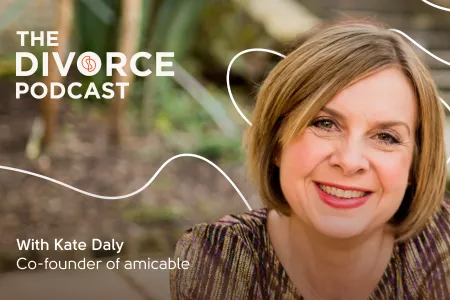How to talk to your partner about an amicable separation when you’re the initiator
When you’ve decided your relationship is over and you’re prepared to move on, one of the biggest frustrations we hear from people is that their partner is just not ready or willing to discuss the options for sorting things out.
In this blog, we look at tips for keeping things amicable when you’re the initiator of the separation and want to discuss how to start your divorce and move things forward. We’ll detail tips for helping your partner understand the amicable options available to them without feeling pushed into a corner.
Step one: Separate the conversations of ‘this is over’ and ‘I want to keep the house’
You need to be sure your relationship is definitely over before you engage in conversations about selling houses, looking after children or splitting pensions. If you’re still not sure whether your relationship is over, or if it’s turned into a ‘situationship’ you should work this out before telling your partner you want to separate.
If you’ve made the decision to separate, the next step is telling your partner, you can read our advice on this or listen to this podcast episode. It’s important to have a conversation to convey that for you the relationship is over. This should not be in the middle of an argument. State clearly and unequivocally that you no longer want to continue in the relationship. You’ll need to allow this conversation to settle - you may have been thinking about this for months or years - it may be a shock to your partner.
"Don’t rush into having a conversation about how to separate finances and sort out children' arrangements."
These are conversations for another day. If your partner asks, just gently say that you are committed to finding a workable solution to all their concerns and that you'd like to agree on the right process to explore all options when the time is right.
Step two: Give your partner space and time
If you’re the initiator, you’ve had more time to process the raw emotions around ending your relationship. This is a double-edged sword because it might mean you’re more eager to move forward with formalising your separation and sorting things out like money and property, but this also means that your partner may be in a very different emotional place on the healing curve and benefit from time and space.
Giving your partner time to digest the news that your relationship is over is important. This represents a significant change; they will need space to process their raw emotions. Make time to answer questions they may have. It’s quite normal and natural for them to want to know why you want to separate, so be prepared to go over this with them.
People always ask, ‘How much time should I give my partner? How do I know when to start divorce proceedings?’.
It’s impossible to put a timeframe on it.
It’s better to think about whether any progress is being made and whether for example, they have told anyone, they have sought any advice or are doing any internet research or seeing a counsellor.
If after three to six months there’s been no progress in how they’re dealing with the raw emotions or their willingness to move forward, they may need to seek therapeutic support to move through this and become ‘unstuck’.
Step three: Approach discussing professional help in a neutral way
If you’ve had an initial consultation with us and you want to separate in an amicable way, telling your partner your preferred way of separating might be challenging if they’ve not had a chance to explore the options available, or if you’re in a difficult place in terms of communication.
A good starting point would be sharing our free resources such as our podcast. This will give them a chance to form their own opinions before feeling pressured to agree with an approach. They can also book an exploratory call to understand the process and be able to ask their own questions.
Finally, once you’ve both had a chance to talk to a specialist, take advantage of a joint follow-up call to answer any final questions before getting started.
FAQs
How do I talk to my partner about separation?
Deciding to end a marriage or partnership is never easy, especially if there are children involved. However, keeping the message simple, and giving your ex-partner time and space to process the news is important.
How do you deal with separation while living in the same house?
It’s important to establish clear boundaries between you both to prevent misunderstandings and to reduce conflict. Zoning your home is a good idea to give you personal space.
How do you make a separation amicable?
If you want to know how to get through a divorce amicably, we suggest you read our divorce tips below. Applying our divorce tips will help you to achieve an amicable divorce or separation for you and your family, which we know can be tricky if you don’t have the right tools.
How do you separate peacefully in a relationship?
It’s important to have a conversation to explain that the relationship is over. This should not be in the middle of an argument. Be certain that you think the relationship is over before instigating the conversation. State clearly that you no longer want to continue in the relationship. You’ll need to allow this conversation to settle, as this may come as a shock to your partner.
Read More
-1.webp)
If you’re struggling with your divorce negotiations, we’ve provided below our top negotiation tips to help you settle your divorce yourselves. We’ve also…
-2.webp)
There are always good ways of giving upsetting news. Preparation on the part of us parents makes things easier for our kids and starts our co-parenting…

The Divorce Podcast explores all aspects of ending relationships, separation and parenting apart. In each episode, Kate is joined by experts and special guests…

Start your amicable divorce journey
Speak to an amicable Divorce Specialist to understand your options and next steps for untying the knot, amicably.
Your guide to a kinder divorce
What if divorce didn’t have to be a battle?
In amicable divorce, Kate Daly offers compassionate, practical guidance to help you separate in a kinder, better way. Whether you’re just beginning, working through the practicalities or adjusting to co-parenting, this book meets you exactly where you are - and helps you move forward with confidence.
Pre-order on Amazon today






Comments (2)
II am finding it so difficult as my husband will not accept I want a divorce we are both tennants in common and we both have pensions of which we use there are no small childen involved so it should be easy ,but I have no ides of how I progress as he will not entertain the idea
Hi Lesly, thank you for getting in touch with amicable. We're so sorry to hear about your situation. Please book a free 15-minute consultation to get some advice on how to get your husband on board. We also have a helpful blog about tenants in common, which could be useful as a starting point for considering the logistics.